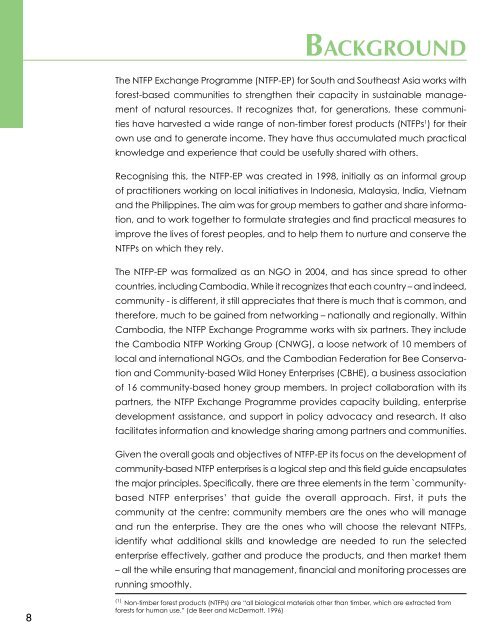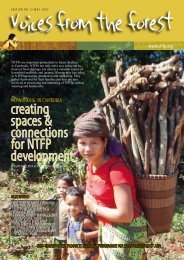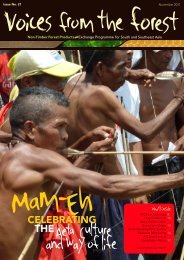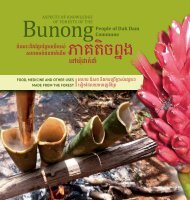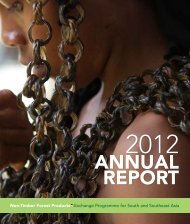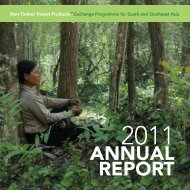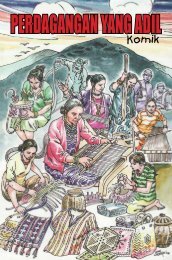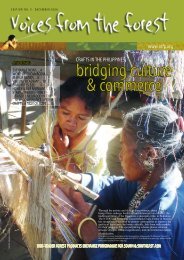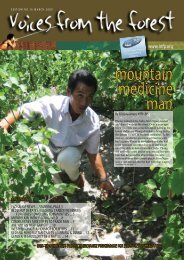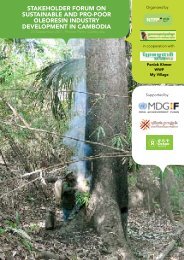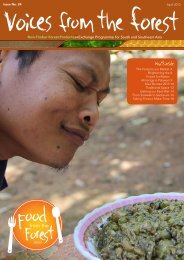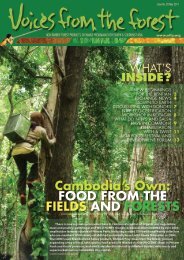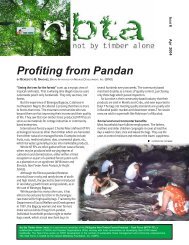Download PDF - Non-Timber Forest Products Exchange Programme
Download PDF - Non-Timber Forest Products Exchange Programme
Download PDF - Non-Timber Forest Products Exchange Programme
You also want an ePaper? Increase the reach of your titles
YUMPU automatically turns print PDFs into web optimized ePapers that Google loves.
Background<br />
The NTFP <strong>Exchange</strong> <strong>Programme</strong> (NTFP-EP) for South and Southeast Asia works with<br />
forest-based communities to strengthen their capacity in sustainable management<br />
of natural resources. It recognizes that, for generations, these communities<br />
have harvested a wide range of non-timber forest products (NTFPs 1 ) for their<br />
own use and to generate income. They have thus accumulated much practical<br />
knowledge and experience that could be usefully shared with others.<br />
Recognising this, the NTFP-EP was created in 1998, initially as an informal group<br />
of practitioners working on local initiatives in Indonesia, Malaysia, India, Vietnam<br />
and the Philippines. The aim was for group members to gather and share information,<br />
and to work together to formulate strategies and find practical measures to<br />
improve the lives of forest peoples, and to help them to nurture and conserve the<br />
NTFPs on which they rely.<br />
The NTFP-EP was formalized as an NGO in 2004, and has since spread to other<br />
countries, including Cambodia. While it recognizes that each country – and indeed,<br />
community - is different, it still appreciates that there is much that is common, and<br />
therefore, much to be gained from networking – nationally and regionally. Within<br />
Cambodia, the NTFP <strong>Exchange</strong> <strong>Programme</strong> works with six partners. They include<br />
the Cambodia NTFP Working Group (CNWG), a loose network of 10 members of<br />
local and international NGOs, and the Cambodian Federation for Bee Conservation<br />
and Community-based Wild Honey Enterprises (CBHE), a business association<br />
of 16 community-based honey group members. In project collaboration with its<br />
partners, the NTFP <strong>Exchange</strong> <strong>Programme</strong> provides capacity building, enterprise<br />
development assistance, and support in policy advocacy and research. It also<br />
facilitates information and knowledge sharing among partners and communities.<br />
Given the overall goals and objectives of NTFP-EP its focus on the development of<br />
community-based NTFP enterprises is a logical step and this field guide encapsulates<br />
the major principles. Specifically, there are three elements in the term `communitybased<br />
NTFP enterprises’ that guide the overall approach. First, it puts the<br />
community at the centre: community members are the ones who will manage<br />
and run the enterprise. They are the ones who will choose the relevant NTFPs,<br />
identify what additional skills and knowledge are needed to run the selected<br />
enterprise effectively, gather and produce the products, and then market them<br />
– all the while ensuring that management, financial and monitoring processes are<br />
running smoothly.<br />
8<br />
(1)<br />
<strong>Non</strong>-timber forest products (NTFPs) are “all biological materials other than timber, which are extracted from<br />
forests for human use.” (de Beer and McDermott, 1996)


